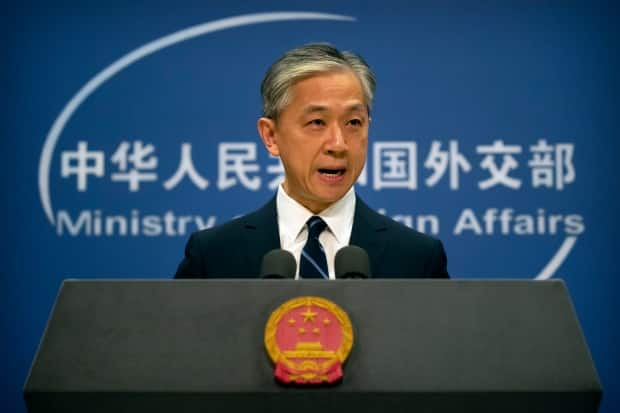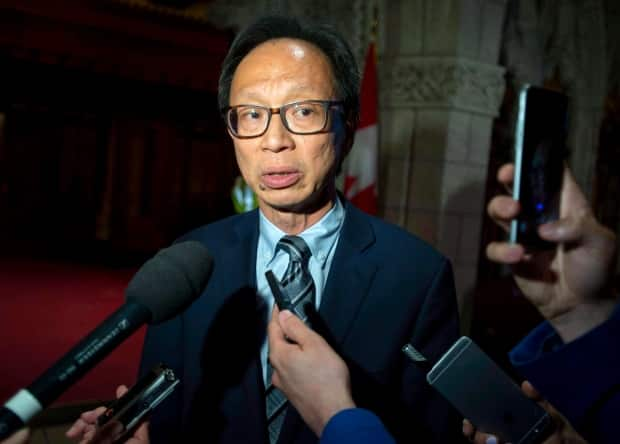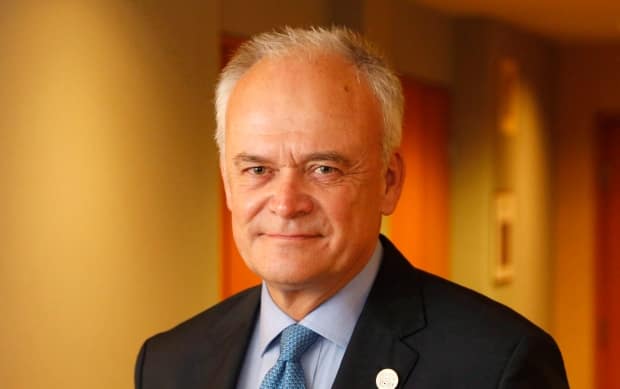China applauds Canadian senators who voted against genocide motion as 'people of vision'

China's foreign ministry is praising Canadian senators who voted down a motion to label the Chinese government's treatment of Uyghurs as genocide — calling them "people of vision" who see through "the despicable schemes of a few anti-China forces."
A spokesperson for the Chinese foreign ministry said Wednesday that the defeat of Motion 79 — which called on the Senate to recognize that China's government is perpetrating a genocide against Uyghurs and other Turkic Muslims — shows that the "the hype of 'genocide' in Xinjiang is unpopular and doomed to fail."
"We urge some Canadian politicians to respect facts, stop the clumsy trick of attacking China for their selfish political gains, and stop interfering in China's internal affairs under the pretext of human rights," said ministry spokesperson Wang Wenbin.
"The rejection of the wrong motion on Xinjiang by the Canadian Senate once again shows that the despicable schemes of a few anti-China forces have been seen through by more and more people of vision."
Twenty-nine senators voted in favour of the motion, 33 senators voted against and 13 abstained.
The vote in the Senate follows on a similar vote in the House in February which saw a substantial majority of MPs — including most of the Liberals who participated — vote in favour of labelling China's treatment of the Uyghurs as genocide.
Prime Minister Justin Trudeau and almost all of his cabinet colleagues were absent for that vote.
Foreign Affairs Minister Marc Garneau was the only cabinet minister present. He abstained when it was his turn to vote.
During debate on the motion in the Senate, Independent Senators Group Leader Sen. Yuen Pau Woo called the motion "an exercise in labelling" and invoked Canada's own terrible history with residential schools.
Woo urged fellow senators to vote against the motion and encouraged Canada to engage in a dialogue with Beijing as a way forward in addressing China's treatment of Uyghurs.

"In making those reflections, Canadians are saying to Chinese friends that we don't want them to make the same mistakes," said Woo.
"We do so not because we have a superior moral position, not because we have the answers to the problems they are trying to solve and not because we want to embarrass China. We do it because of the pain we feel over what happened in our own country and for what we can learn from each other in not making such mistakes again."
China seizing on residential school reckoning
While the Chinese foreign ministry spokesperson made no mention Wednesday of the legacy of Canada's residential schools, China has seized in recent weeks on the reported discovery of hundreds of unmarked graves on former residential school grounds.
On the same day last week that Canada helped to launch an international effort at the United Nations to demand that China allow free access to Xinjiang to investigate reported human rights violations, China and its allies called on the UN to investigate crimes against Indigenous people in Canada.
"With these discoveries, the dark chapter in Canada's history has been revealed more and more in front of the whole world," said Chinese foreign ministry spokesperson Zhao Lijian last Friday.
"This is an indictment of the Canadian government's historical debt to the Indigenous people. It also reflects the Indigenous community's helplessness in front of their present bleak conditions."
Sen. Peter Boehm, who also opposed the motion, said China's call for an investigation into Canada's treatment of Indigenous people amounts to a "false equivalency."
"In Canada, and despite our troubled history, we have had inquiries, apologies, a Truth and Reconciliation Commission and are going through a period of both reflection and investigation that will be ongoing," he said.
Boehm, who chairs the Senate foreign affairs committee, said he was opposed to the motion, in part, because it amounted to "megaphone parliamentary diplomacy."
"This motion, in my view, will not advance the importance of addressing the situation in western China, nor will it contribute to resolving or alleviating an already fraught and complex relationship that we now have." Boehm said.
"Determined international work with our friends and allies can hopefully make a bigger difference in dealing with what is clearly a troubling situation for the Uyghur and Turkic Muslim minority in China."

After the motion's defeat, Sen. Leo Housakos, who moved the motion, said in a tweet that it was "disappointing yet unsurprising."
"I guess persecution of Muslims based on their faith is okay for Justin Trudeau's government," said Housakos. (The vote on Motion 79 was only among senators, not MPs.)
"The authoritarian state of China is committing these atrocities, these crimes against humanity, with impunity. They're arrogant in their blatant disregard for human life and human rights, and we must not allow it to go unchecked and unnamed for what it is," said Housakos during debate.
Trudeau and his government have been reluctant to use the word genocide to describe China's treatment of the Uyghurs, arguing that more evidence from independent investigations is needed.
An independent legal analysis released earlier this year by the Montreal-based Raoul Wallenberg Centre for Human Rights and a Washington-based think-tank concluded that China is committing an ongoing genocide against its Muslim minority population in Xinjiang.

